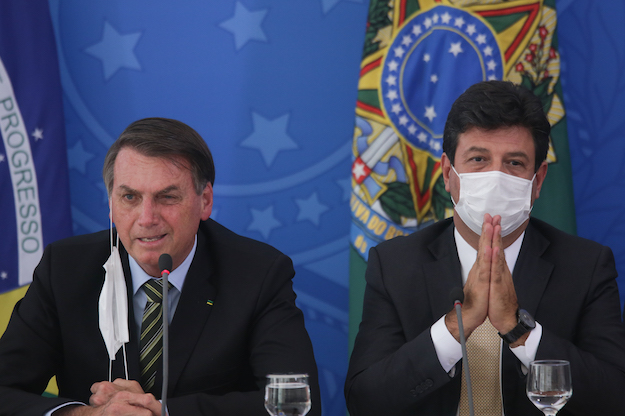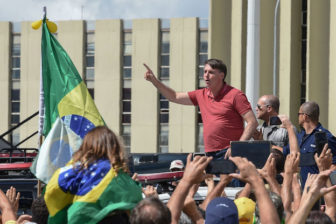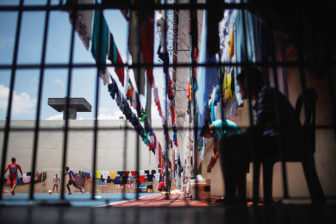SÃO PAULO – As the coronavirus mercilessly spread in recent weeks, Jair Bolsonaro frequently sought to minimize the risk, claiming the pandemic was a “fantasy” and “hysteria” promoted by the media to weaken the government. Despite warnings by public health experts, Bolsonaro called on his supporters to join pro-government protests in cities across the country. On the day of the march, Bolsonaro personally greeted hundreds of supporters in front of the presidential palace while still waiting for his own virus test results (they eventually came back negative), after more than a dozen of his advisors had tested positive following a trip to the United States.
To his critics, Bolsonaro’s decision didn’t just put the lives of many people at risk. It also marked a turning point in his presidency. “The political winds are changing,” Pedro Doria, a newspaper columnist and radio commentator wrote on Twitter. Joel Pinheiro, a columnist at Folha de São Paulo, wrote Monday that “a key has turned.” A video of a Haitian migrant confronting Bolsonaro saying “You are no longer the president,” went viral on social media.
For two consecutive nights on Tuesday and Wednesday, huge pot-banging protests against Bolsonaro could be heard in upper and upper-middle class areas of several Brazilian cities that voted overwhelmingly for the president in the 2018 election. Many drew parallels with similar protests that destroyed the presidencies of Dilma Rousseff and Michel Temer – the former was impeached, and some are now openly wondering whether Bolsonaro will face a similar fate.
It seems too early to assess whether the virus poses a terminal risk to Bolsonaro’s presidency; other leaders including his ally Donald Trump eventually embraced a more serious tone after initial missteps. But Brazil is not the United States; recent years have shown how quickly the public here can turn on its leaders. It’s clear the coming days will be critical.
Public opinion polls as recently as January showed Bolsonaro’s personal approval rating in the 40s – not bad for any global leader in this polarized world. But even before the gravity of the pandemic became clear, there was clear discontent among moderates who voted for Bolsonaro because they expected him to fix the economy – and believed that, despite his radical rhetoric, Bolsonaro would leave the complex policy details to the experts. With Brazil now looking certain to tip back into recession in 2020, it is this group of former Bolsonaro voters that has been abandoning the president in droves. After all, the room for decisive fiscal action as seen in Europe is very limited, and with commodity prices at their lowest level since 1986, Latin American economies are likely to be especially hard-hit.
In recent weeks, many moderates supportive of Guedes’ liberal agenda seem to have realized while Bolsonaro may excel at entertaining and provoking opponents, he “lacks the capacity, attitude and common sense to manage this crisis,” as João Amoêdo, a center-right former presidential candidate wrote on Twitter. It does not help that the president is said to be increasingly unhappy with his Health Minister Luiz Henrique Mandetta, a doctor and the only cabinet member who refused to condone the president’s theories about the pandemic. Mandetta is “too technical“, the president’s more ideological advisors complained.
São Paulo governor João Doria declared he “regretted” having voted for Bolsonaro.
Perhaps more importantly, several conservative allies have begun to distance themselves from the president. Janaína Paschoal, a São Paulo state legislator who rose to fame as one of the authors of the petition that initiated the impeachment process of Rousseff in 2016, has said Bolsonaro needed to be removed from office. São Paulo governor João Doria declared he “regretted” having voted for Bolsonaro, and Ronaldo Caiado, a conservative governor of the state of Goiás and a Bolsonaro supporter, fiercely criticized the pro-Bolsonaro protesters on March 15 for ignoring the government’s recommendation to implement social distancing. Even José Luiz Datena, a famous right-wing TV host, said Bolsonaro’s behavior to ignore medical expert advice to self-isolate until the test results became available set a “very bad example“. Thomas Traumann, a prominent political analyst, wrote that “for the first time, Bolsonaro lost control of social media” – no small detail considering how central online platforms are for the president’s overall strategy.
All that is set to increase Bolsonaro’s dependence on his most radical supporters, few of whom will blame the president for the severe crisis that is looming. A look at the debates inside several pro-Bolsonaro WhatsApp groups suggests that many hardliners are convinced the pandemic is either non-existent or part of a premeditated attack by China on capitalism and the West. Rejecting virtually anything that appears in the mainstream media, it is far from clear that Bolsonaro’s die-hard fans will turn on the president, even if the death toll mounts and the economy collapses.
The pandemic may still offer opportunities for Bolsonaro to respond to the crisis. First of all, inspired by Trump’s insistence on using the term “Chinese Virus”, he will seek to strengthen his anti-globalist narrative and revive his anti-China rhetoric. After keeping quiet about the Middle Kingdom for months, Bolsonaro’s son Eduardo recently argued that China was to blame for the pandemic, showing how important it is for the Brazilian government to continuously face powerful threats and enemies. (China’s ambassador to Brazil responded forcefully on Twitter, telling Eduardo Bolsonaro not to be a “spokesman for the US.”) The more destructive the crisis becomes, the more attractive the vilification of China may become to Bolsonaro voters.
Secondly, a global pandemic and an economic collapse that may be more severe than that of the global financial crisis in 2008 may help Bolsonaro embrace the role of a “war-time president” and possibly restrict civil liberties, allowing him to ask the population to overcome internal divisions to fight a larger enemy. This may “work” even if the government’s overall strategy to combat the pandemic is insufficient – after all, considering the complexity of the crisis, even countries with a sophisticated medical infrastructure are likely to struggle enormously, as the situation in Northern Italy suggests.
With thousands of deaths, overflowing hospitals and morgues, even Bolsonaro’s fiercest critics are unlikely to reject his calls for unity and solidarity and for putting partisan divisions aside. As a result, an open challenge to his authority during the height of the pandemic would become less likely. If things reach a certain level of public despair and the country’s energy and attention is absorbed by the crisis, the opposition may struggle to gather support for impeachment proceedings until the pandemic has subsided – after all, protesters cannot even take to the streets against the president given the requirements of social distancing.
There is no doubt Bolsonaro’s strategy to handle the pandemic has gotten off to a catastrophic start, costing the president valuable political capital and putting countless lives at risk. As Brazil heads into the storm, he is facing the greatest crisis of his turbulent presidency.









